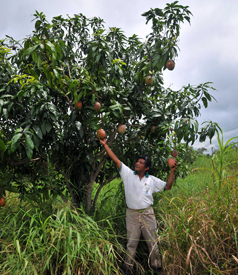Support justice-driven, accurate and transparent news — make a quick donation to Truthout today!
Asuncion – Small-scale agriculture based on the principles of solidarity and cooperation is the only way to guarantee food sovereignty in Latin America, said peasant and indigenous activists meeting in the Paraguayan capital this week.
While the concept of food security refers to the availability of, and access to, sufficient food, food sovereignty — a concept introduced by small farmer movements — puts the emphasis on how food is produced and on the right of each country to determine its own agricultural policies in order to ensure development and guarantee the right to food.
During one of the conferences at the Fourth Americas Social Forum, running Aug. 11-15 in Asunción, the focus was on “food sovereignty and struggles for territory and agrarian reform”. The panelists included representatives of civil society groups from Brazil, Cuba, Ecuador, Guatemala and Paraguay.
Referring to the struggle between the agribusiness and agroecological models of farming, the panelists said small farms are the only way to ensure healthy and sustainable diets and food sovereignty.
Dolores Sales with the Coordinadora Nacional Indígena y Campesina de Guatemala, a national association of indigenous and peasant farmers from Guatemala, said the fight for the defence of the right to land must become a top priority focus of the agenda in the Americas.
“This should be a struggle taken up by everyone, above and beyond the impressive speeches,” said Sales, who pointed out that many indigenous communities are threatened by the expansion of monoculture crops and tree plantations, which are endangering human sustenance.
Roberto Baggio with Brazil’s landless movement, the MST, said agrarian reform, food sovereignty and agroecology are essential elements of the proposed model of grassroots, sovereign agriculture.
And in order to bring this about, he said, certain things are essential: the democratisation of access to property and production, and the development of an economy that is sustainable and based on solidarity and cooperation.
“When we talk about agrarian reform, we’re talking about making access to property more democratic and laws that make it possible to take action, because a good land reform programme is not sufficient, if concrete actions are not taken,” he said.
Another point mentioned by the Brazilian activist is the importance of agroecology as the basis for small-scale farming aimed at generating food in an autonomous, healthy manner, without toxic pesticides and fertilisers.
Luis Andrango, head of the Confederación Nacional de Organizaciones Campesinas, Indígenas y Negras (FENOCIN), a national confederation of peasant, indigenous and black farmers of Ecuador, said that despite the land reform processes attempted in Ecuador in 1964 and 1973, in the last few decades governments have only backed the agro-export model, which has resulted in increasing concentration of land ownership.
A full 75 percent of arable land in Ecuador is dedicated to just five agro-export crops, which “have supposedly created jobs, but the only thing they have left are higher levels of land concentration, pollution and exploitation in the countryside.”
But the Ecuadorean rural leader said that despite the undermining of the family farm, four of the most widely consumed farm products on the local market are still largely produced by peasant farmers.
For example, 64 percent of the potatoes consumed by Ecuadoreans are produced by small farmers, along with 42 percent of the milk, 46 percent of the corn, and 48 percent of the rice.
According to the International Fund for Agricultural Development (IFAD), 80 percent of the food consumed in the developing world is produced by small farmers.
But the agro-export model has turned small farmers in Latin America into paid rural workers, who earn low wages and work in poor labour conditions, said Andrango.
“They continue to deceive us” with arguments that agribusiness generates jobs, “but the truth is that peasant labour is gradually being replaced by machinery,” he said, citing the case of Chile, where 60 percent of all fruit is produced by just three transnational corporations.
Andrango said that what is needed is an agrarian reform effort that not only involves the redistribution of land, but also introduces reforms with regard to elements that have been privatised along with land, like seeds, water, credit and farm insurance.
Paraguayan sociology professor Tomás Palau called for the questions of food and land reform to be included in the political debate.
He said food security is a problem of the loss of territorial and cultural sovereignty, and noted that in Paraguay, 20 percent of the land is foreign-owned, mainly by agribusiness interests.
The Americas Social Forum ends Sunday with a speech by leftwing Bolivian President Evo Morales, possibly accompanied by Paraguay’s centre-left leader Fernando Lugo, who celebrates his second anniversary in office that day.
However, Lugo’s participation has not been confirmed, because he is under treatment for recently diagnosed lymphatic cancer.
Uruguayan President Pepe Mujica, a former Tupamaro guerrilla, is also expected to attend the gathering, which has included nearly 400 workshops, lectures, panels, conferences and cultural activities organised by some 600 participating local and international groups and movements
The Americas Social Forum forms part of the regional activities of the World Social Forum, the world’s largest gathering of organisations and movements opposed to capitalist globalisation.
![]()
Visit IPS news for fresh perspectives on development and globalization.
Media that fights fascism
Truthout is funded almost entirely by readers — that’s why we can speak truth to power and cut against the mainstream narrative. But independent journalists at Truthout face mounting political repression under Trump.
We rely on your support to survive McCarthyist censorship. Please make a tax-deductible one-time or monthly donation.
